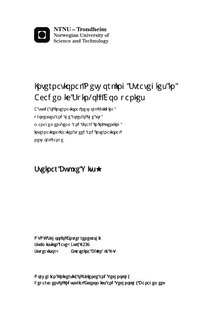| dc.description.abstract | AbstractPurpose International Entrepreneurship (IE) is a new field of multi-disciplinary enquiry that has its roots in studying the fascinating phenomenon of the emergence of born globals. These small- and medium sized firms internationalize at or near their founding and represent a growing number of entrepreneurial firms. A considerable number of born globals are spin-offs which utilize technology originally developed in academic institutions. Academic spin-offs (ASOs) have been studied from different angles (e.g. spin-off formation rates, technology transfer offices, university systems), but the research on teams and boards in ASOs has so far been limited, and the research on internationalization issues in these firms is almost absent. This study addresses the understudied phenomenon of ASO's international network building, and the roles of the top management team and the board of directors in the internationalization of small academic spin-offs.Theory The dynamic capability view (DCV) suggests that firms need to develop new capabilities to identify opportunities and respond quickly to them. The DCV can be used as a framework to analyze internal capabilities and how these change over time as networks are built, reconfigured, added and split up. The resource dependence view (RDV) suggests that the long-term survival and success of a firm is dependent on its abilities to link the firm with its external environment. In this respect various organizational goals can be reached by building international relationships and by recruiting outside members to the team and board that can help link the firm and its environment by providing legitimacy and network resources.Research problem How and why do born global ASOs build international network relationships? The research problem guiding this study tries to deepen our understanding of ASO's international network building and what the respective roles of the top management team (TMT) and board of directors are in these processes. Methodology/approach - The thesis draws on seven case studies that are high-technology ASOs from Norwegian academic institutions. The multiple case study is confirmatory, in the sense that earlier theories are reviewed, and at the same time inductive from the observation of the non-expected details and deeds of the cases. Data was collected through semi-structured in-depth face-to-face interviews with the company Chief Executive Officers (CEOs) in the spring semester of 2014. Tentative propositions for future research is presented.Findings In most cases the firms have needed to build new international networks over a long period of time to acquire limited resources and build legitimacy. Useful behavioral characteristics of managers are those of innovativeness, proactiveness and risk-willingness (as earlier described in the literature), but also capabilities like trustworthiness, flexibility and determination seem to be important. The findings indicate that the CEO's entrepreneurial mind-set is an important determinant for internationalization speed. But the companies that use the TMT and board as a resource and make use of their international social networks achieve a higher success rate in terms of network range. Thus the CEO as the sole driving force behind internationalization can lead to early internationalization, but this does not necessarily lead to a broad network range and long-term success. Originality/value - The study makes several contributions to the literature on international entrepreneurship, academic entrepreneurship and corporate governance by identifying the impact of dynamic networking capabilities and resource dependence, and arguing how the CEO, TMT, and board play varying but important roles in the context of born global ASOs. Future research directions and practical implications for those who are thinking of starting new international businesses are presented.Keywords Internationalization, Networks, born globals, Academic spin-offs, Team and Board roles | nb_NO |

